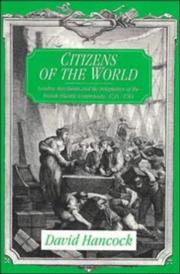| Listing 1 - 10 of 23 | << page >> |
Sort by
|

ISBN: 0521474302 Year: 1995 Publisher: Cambridge : Cambridge University Press,
Abstract | Keywords | Export | Availability | Bookmark
 Loading...
Loading...Choose an application
- Reference Manager
- EndNote
- RefWorks (Direct export to RefWorks)
Citizens of the World examines the business and social strategies of the men who developed the British empire in the eighteenth century. This book focuses on twenty-three London merchants who traded with America in an age of imperial expansion. These 'associates' started their careers as marginal people, sought and took advantage of opportunities around the world, and approached their business and social lives with the integrating and improving ideals of the practical Enlightenment. Professor Hancock reveals how they managed the business of the empire and turned themselves into gentlemen: he tracks their shipping over fifty years, investigates their farms and plantations, cumulates their investment portfolios, follows them into their scientific societies, and watches them build country houses and fill them with art. He places all this activity in the context of the developing institutions of Britain's colonies in America and polite society at home.
Merchants --- British --- Commerçants --- Britanniques --- History --- Histoire --- London (England) --- United States --- Londres (Angleterre) --- Etats-Unis --- Commerce
Book
ISBN: 9780300136050 Year: 2009 Publisher: New Haven : Yale University Press,
Abstract | Keywords | Export | Availability | Bookmark
 Loading...
Loading...Choose an application
- Reference Manager
- EndNote
- RefWorks (Direct export to RefWorks)
Madeira wine --- Wine industry --- Madère (Vin) --- Vin --- History --- Histoire --- Industrie --- Madeira (Madeira Islands) --- Atlantic Ocean Region --- Madère (Madère) --- Atlantique, Région de l' --- Commerce --- Fortified wine industry --- Fortified wines --- Wine and wine making --- Ilha da Madeira (Madeira Islands) --- Madeira --- Islands of the Atlantic --- Atlantic Area --- Atlantic Region

ISBN: 052162942X Year: 1997 Publisher: Cambridge (Mass.) Cambridge University Press
Abstract | Keywords | Export | Availability | Bookmark
 Loading...
Loading...Choose an application
- Reference Manager
- EndNote
- RefWorks (Direct export to RefWorks)

ISBN: 9780521474306 9780521629423 Year: 2005 Publisher: Cambridge Cambridge University Press
Abstract | Keywords | Export | Availability | Bookmark
 Loading...
Loading...Choose an application
- Reference Manager
- EndNote
- RefWorks (Direct export to RefWorks)
World history --- anno 1700-1799 --- London
Book
ISBN: 9780747803768 Year: 2011 Publisher: Oxford : Shire Publications,
Abstract | Keywords | Export | Availability | Bookmark
 Loading...
Loading...Choose an application
- Reference Manager
- EndNote
- RefWorks (Direct export to RefWorks)
Dog breeds --- Working dogs --- History
Book
ISBN: 1351118668 1351118641 135111865X Year: 2018 Publisher: Abingdon, Oxon ; New York, NY : Routledge,
Abstract | Keywords | Export | Availability | Bookmark
 Loading...
Loading...Choose an application
- Reference Manager
- EndNote
- RefWorks (Direct export to RefWorks)
Why, since the financial crisis of 2008, has neoliberal capitalism remained seemingly impregnable? Why, when it is shown as no longer capable of delivering on its economic promises does its logic pervade all facets of contemporary life? How has it seduced us? This book examines the seductive appeal of neoliberalism by understanding it as a fundamentally counter-cultural logic. Unlike earlier modes of capitalism, neoliberalism is infused by spirit of rebellion and self-creation, with the idealised neoliberal subject overturning traditional morality whilst creating new modes of being based on risk and excess. Tracing the development of the logic of neoliberalism from its beginnings in the thought of Friedrich Hayek in the wake of the post-war period, through the work of neoconservative writers overcoming and moving beyond what they perceived as the nihilism of both the counter-culture and capitalism of the 1960s and 70s, to its establishment as a new moral order underpinning the economic system from the 1980s onwards, the author argues that it is only through a clear understanding of the seduction of neoliberalism that it can be overcome by reimagining our relationships to work and society.
Book
ISBN: 1351896237 1409408736 9786612785849 1315241838 1282785842 1138465585 9780566092428 0566092425 9781409408734 6612785845 9781315241838 9781282785847 9781138465589 Year: 2010 Publisher: Farnham, Surrey [U.K.] Burlington, VT Gower.
Abstract | Keywords | Export | Availability | Bookmark
 Loading...
Loading...Choose an application
- Reference Manager
- EndNote
- RefWorks (Direct export to RefWorks)
The general perception amongst most project and risk managers that we can somehow control the future is, says David Hancock, one of the most ill-conceived in risk management. The biggest problem is how to measure risks in terms of their potential likelihood, their possible consequences, their correlation and the public's perception of them. The situation is further complicated by identifying different categories of problem types; Tame problems (straight-forward simple linear causal relationships and can be solved by analytical methods), and 'messes' which have high levels of system complexity and have interrelated or interdependent problems needing to be considered holistically. However, when an overriding social theory or social ethic is not shared the project or risk manager also faces 'wickedness'. Wicked problems are characterised by high levels of behavioural complexity, but what confuses real decision-making is that behavioural and dynamic complexities co-exist and interact in what is known as wicked messes. Tame, Messy and Wicked Risk Leadership will help professionals understand the limitations of the present project and risk management techniques. It introduces the concepts of societal benefit and behavioural risk, and illustrates why project risk has followed a particular path, developing from the basis of engineering, science and mathematics. David Hancock argues for, and offers, complimentary models from the worlds of sociology, philosophy and politics to be added to the risk toolbox, and provides a framework to understand which particular type of problem (tame, messy, wicked or messy and wicked) may confront you and which tools will provide the greatest potential for successful outcomes. Finally he introduces the concept of 'risk leadership' to aid the professional in delivering projects in a world of uncertainty and ambiguity. Anyone who has experienced the pain and blame of projects faced with overruns of time or money, dissatisfied stakeholders or basic failure, will welcome this imaginative reframing of some aspects of risk management. This is a book that has implications for the risk management processes, culture, and outcomes, of large and complex projects of all kinds.

ISBN: 9781843922896 9781843925965 9781134010714 9781134010783 9781134010851 9781843922902 Year: 2007 Publisher: Cullompton Willan
Abstract | Keywords | Export | Availability | Bookmark
 Loading...
Loading...Choose an application
- Reference Manager
- EndNote
- RefWorks (Direct export to RefWorks)
Probation --- Suspended sentence --- Alternatives to imprisonment
Book
ISBN: 3030159663 3030159655 9783030159658 Year: 2019 Publisher: Cham : Springer International Publishing : Imprint: Palgrave Macmillan,
Abstract | Keywords | Export | Availability | Bookmark
 Loading...
Loading...Choose an application
- Reference Manager
- EndNote
- RefWorks (Direct export to RefWorks)
This book is an introduction to cosplay as a subculture and community, built around playful spaces and the everyday practices of crafting costumes, identities, and performances. Drawing on new and original ethnographic data, as well as the innovative use of arts-led research, this book adds to our understanding of a popular, global cultural practice. In turn, this pushes forward our understanding of play, fan practices, subcultures, practice-led research, and uses of urban spaces. Cosplay and the Art of Play offers a significant addition to key contemporary debates on the meaning and uses of popular culture in the 21st century, and will be of importance to students and scholars interested in communities, fandom, identity, leisure, participatory cultures, performance, and play.
Sports-Sociological aspects. --- Sociology, Urban. --- Youth-Social life and customs. --- Fine arts. --- Sociology of Sport and Leisure. --- Cultural Studies. --- Sociology of Culture. --- Urban Studies/Sociology. --- Youth Culture. --- Fine Arts. --- Urban sociology --- Cities and towns --- Sports—Sociological aspects. --- Cultural studies. --- Culture. --- Youth—Social life and customs. --- Cultural sociology --- Culture --- Sociology of culture --- Civilization --- Popular culture --- Social aspects --- Cultural studies --- Youth - Social life and customs --- Sociology of sport and leisure --- Sports - sociological aspects --- Sociology, Urban --- Sports --- Youth --- Art. --- Cosplay. --- Costume play --- Amusements --- Role playing --- Art, Occidental --- Art, Primitive --- Art, Visual --- Art, Western (Western countries) --- Arts, Fine --- Arts, Visual --- Fine arts --- Iconography --- Occidental art --- Visual arts --- Western art (Western countries) --- Arts --- Aesthetics --- Sociology of sports --- Sociology --- Sociological aspects. --- Study and teaching. --- Social life and customs.
Book
ISBN: 1614482519 9781614482512 Year: 2018 Publisher: Newburyport Morgan James Publishing
Abstract | Keywords | Export | Availability | Bookmark
 Loading...
Loading...Choose an application
- Reference Manager
- EndNote
- RefWorks (Direct export to RefWorks)
The key to dissolving the barriers that have kept you from sales success.
Selling --- Salesmanship --- Salesmen and salesmanship --- Business --- Retail trade --- Advertising --- Marketing --- Sales promotion --- E-books --- Selling.
| Listing 1 - 10 of 23 | << page >> |
Sort by
|

 Search
Search Feedback
Feedback About UniCat
About UniCat  Help
Help News
News